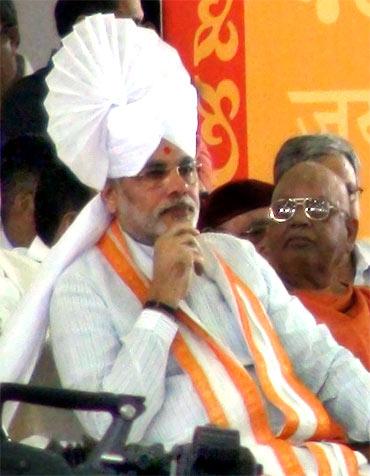
"I am praying that God lets me sacrifice myself for the sake of harmony," said Gujarat Chief Minister Narendra Modi at the Gujarat University Convention Centre hall in Ahmedabad.
Modi started his much-hyped "designer fast" with a speech on his views on the last nine years of Gujarat, which witnessed bloody communal riots in 2002, followed by intense legal battle between the State and the victims of riots.
At the end of his much-awaited speech, Modi, however, came out as merely a political leader rather than a reconciliatory human.
Gujarat faced brutal communal riots in February, 2002, after the burning of a train in Godhra. Modi has never spoken about it. He has never spoken publicly about why he failed to control the riots. He has never shed any light on why he failed to provide security to the minority community, which was targeted in the mob frenzy.
...

Even after nine years, he is not explaining to people why he could not maintain law and order. One doesn't know whether he felt sorry or not when Ahmedabad was burning.
Even today, Modi didn't answer any of these legitimate questions.
But, while speaking about his governance and actions during the riots, Modi said, "With a firm hand and with full strength, we put in efforts (to control the riots)."
Talking about the riots that killed more than 900 Muslims, he said, "It doesn't speak well of any civil society. Such was the frenzy at that time; such was the atmosphere that nobody was ready to understand or was ready to listen to our hurt or pain (dard aur peeda). Whoever got the chance, started criticising or defaming Gujarat."
He said during the riots, "Nobody extended any support to Gujarat. We were left to find our own destiny."
"When nobody supported Gujarat, we decided we will find our own way," he said.
In the rest of his speech, he talked about Gujarat's progress.
...
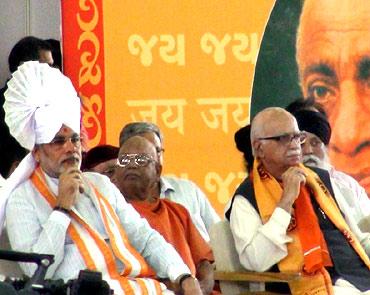
The stage on which he is holding his fast has a saffron background and photographs of Mahatma Gandhi and Sardar Vallabh bhai Patel. A big picture of Bharat mata, a favourite of the Rashtriya Swayamsevak Sangh, had been kept in the front.
Modi himself came to the venue a little late after changing the blue kurta he had been wearing since morning.
He wore a white kurta pajama to convey the message of "peace."
His main theme was that in spite of "julum, atyachar, pratikar aur aarop" (injustice, torture, resistance and allegations) against Gujarat, it has not only been able to develop but even set an example for the nation.
He said, dramatically, that the stones hurled at Gujarat were used to build the way to reach new heights of development.
He cleverly used the word sadbhavana to start the reconciliation project, publicly. (Sad means good and bhavna means emotion).
Many found that Modi spoke too late and too little on Gujarat riots. His shrill tone and his shrewd manipulation of words didn't give him the chance to turn the pages of the history of 2002.
...
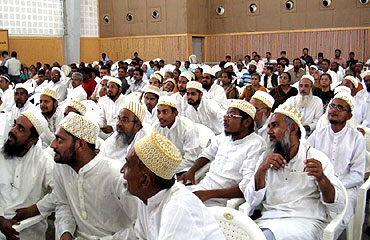
Realising that he hasn't spoken enough to soothe the feelings of riot victims, Modi said that on Monday, when he ends his fast, he will speak more from his heart.
Although the fast had been planned in a hurry, Modi's organising capacity was there for all to see at the venue. The use of state power, party's resources, huge funds and Modi's knowledge of state-wide organisations was evident.
Bharatiya Janara Party workers from all over Gujarat have been arriving in buses at fixed time at Ahmedabad. They have also been given a fixed time to arrive at the venue.
For example, supporters from Maninagar have been asked to arrive at 11 am on Sunday. Muslims of Juhapura (abused as "mini Pakistan" by many BJP leaders) arrived at around 1 am.
In today's show, Muslims, mainly from the Dawoodi Vohra community, came to attend Modi's fast from Abdasa in Kutch and Surendranagar in Saurashtra. Hundreds of BJP supporters also came from Rajkot.
One hardly saw any "public"; the hall was full of "managed crowd" brought in through a systematic manner. Undoubtedly, people brought from far-flung places were Modi's die-hard supporters.
...
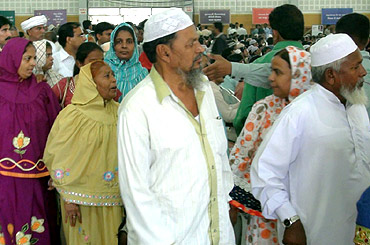
When Modi was on stage today at around 11.30 am, nearly 500 Muslims, brought from Kutch and Saurashtra, were sitting before him.
Sabir bhai owns a mobile phone shop in Surendranagar.
He said, "Our revered Guru Syedna told us to support him. Modi went to him and bowed to him. We want Modi because we are feeling secure."
According to them, the Modi-led state government was "kind enough" to give their community a plot of land in Ahmedabad.
Sabir's colleague Vajifa bhai runs a small business in Surendranagar. He said, "Our guru said support the leader who is coming to you with words of solace. Modi gave us so many cuts but he is giving us marham (healing medication), too. We believe if the Congress comes to power, then these people will be in the Opposition and they will keep protesting."
Sehzad Pathan, another Muslim at the venue, has launched a trust with government funding.
He said, "We have not forgotten the riots. We are not with the BJP but we are with Modi's policy. We are with the government. Modi is good for Gujarat. He should be around for ten more years so that our villages get all essential amenities."
According to Sabir bhai's father, the Vohra community believes that you must be faithful to your village, city, state and nation. The leader of your state must be respected so that the welfare of the community is never in jeopardy, they believe.
...
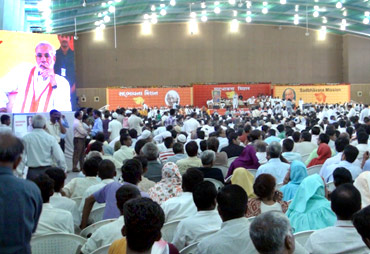
The event in Ahmedabad also shows that since the last nine years, Modi has worked covertly inside the Muslim community, away from hawkish elements, to take them into confidence.
Although he has only been partially successful, this fast is an event to exhibit that Gujarati Muslims are getting their due political share from the leader who is begging them to not sulk.
Sufi Sant Mehbubbhai Bawa, president of the Gujarat State minority wing of the BJP, told rediff.com, "Modi saheb has got 200 Muslims elected in various bodies all over the state."
Truckloads of buses with Modi's supporters have come from Abdasa, Kutch, Rajkot, Surendranga, Amreli, Valsad and Bapunagar.
Modi's speech, as expected, didn't carry any notes of apology or regret for the Muslims of Gujarat who died in 2002 when violent mobs targeted whoever "looked like Muslims."
The BJP volunteer advised some journalists, "Meet lots of dhadhiwalas (bearded men). They will vote for Modi. They have no bitter feelings."
The back benchers at the fast venue were a treat to the eyes. The BJP supporters and hundreds of Muslims were listening to Modi attentively.
In the air-conditioned hall, the real warmth emanated from these Gujarati-speaking Hindus and Muslims, who are supporting Modi and the BJP for the sake of peace and a hopeful future. The idea of earning money under the fast-track economy of Gujarat is their focus.
Today's event showed how little the hawkish media and vote-lusty politicians could gauge the minds of minorities in India.
So many Muslims said, in their own ethnic language and colloquial expressions, that time had healed their wounds.
Mazi ben, a Muslim woman from Abdasa, said, "Vatan payru che. (I love my birthplace.) I don't want a fight. I want my home."